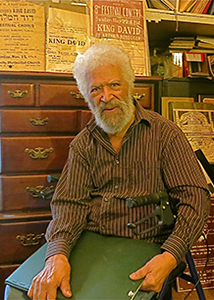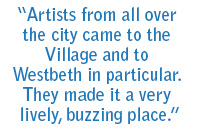 Opera singer, narrator, actor, and director Salvador Peter Tomas was born in Pass Christian, Mississippi in 1920. Tomas is an alumnus of The Juilliard School, Trinity College in London, and the Fontainebleau School in France. As an opera singer, his repertoire includes standard bass baritone roles and as a narrator, he narrated Honegger’s “Le Roi David” for over twenty years in recital halls and theaters around the country.
Opera singer, narrator, actor, and director Salvador Peter Tomas was born in Pass Christian, Mississippi in 1920. Tomas is an alumnus of The Juilliard School, Trinity College in London, and the Fontainebleau School in France. As an opera singer, his repertoire includes standard bass baritone roles and as a narrator, he narrated Honegger’s “Le Roi David” for over twenty years in recital halls and theaters around the country.
When he was seven years old, Salvador Peter Tomas’ mother—in response to his father’s affair with a local woman and the ensuing scandal—whisked him and his six sisters to New York City. “It was a good reason to leave,” Tomas says. “We were part of the exodus leaving a South full of violent racial prejudice. I don’t even remember preparing to leave; it was so sudden. The traumatic thing that has colored my whole life is saying goodbye to my father on the train. I said to him, ‘I’ll never see you again!’ That happened to be true. After that, I was looking for my father all of my life.”
Tomas’ mother eventually bought a house in Queens where they settled down and he could pursue his joy of singing. “I was always singing,” he says. “I was in the glee club, the drama club, and in operettas throughout junior and high school.” After his WWII service in Europe where he was part of the Signal Corps attached to aviation, Tomas took advantage of the G.I. Bill to attend Trinity College in London and study voice and drama. “I was in a graduation performance at Trinity and I was so well received,” he says. “They said to me, ‘We didn’t think you could do it.’ That was a nice compliment! People were always telling me they didn’t think I could do it. It was because I got roles that were not ordinarily assigned to a person of color.”
Aside from having the talent, how did he manage to land those roles? “Because I went into the arts, music, and opera, I always associated with people who are on the better side of living,” he explains. “They have access to more money, more education, and to each other’s help. So they helped me as well.” It was this combination of people taking an interest in him and then using their influence that advanced Tomas’ career. “That’s how I got a scholarship to Fontainebleau,” he says. “And it was the interest of people at Juilliard that gave me the opportunity to narrate almost 100 performances of Le roi David over the years. I made a career just out of that. Don’t get me wrong. There are crappy people everywhere. But that’s the wonderful thing about being a human being. You never know when you’re going to find another fantastic one!”
 Tomas moved into Westbeth when it opened in 1970 and remembers a different world. “It was a run down waterfront, just like Marseille,” he says. “A no man’s land. The elevated highway was still there and the gay traffic was incredible. There were bars on 14th Street, lots of clubs and a huge multi-level gay disco just a couple of blocks from here. Although the piers were boarded up they would always be broken into and orgies went on in them. Then there were the parked trucks down here where guys would carry on as well. For myself, I never overdid anything and I mostly kept away from that.”
Tomas moved into Westbeth when it opened in 1970 and remembers a different world. “It was a run down waterfront, just like Marseille,” he says. “A no man’s land. The elevated highway was still there and the gay traffic was incredible. There were bars on 14th Street, lots of clubs and a huge multi-level gay disco just a couple of blocks from here. Although the piers were boarded up they would always be broken into and orgies went on in them. Then there were the parked trucks down here where guys would carry on as well. For myself, I never overdid anything and I mostly kept away from that.”
It wasn’t just the gay scene, though, that characterized the area. “Artists from all over the city came to the Village and to Westbeth in particular,” Tomas says. “They made it a very lively, buzzing place. Many people were able to function, blossom, and realize their own potential without the pressure of earning lots of money. And the landlords left you alone when they thought their property was not worth anything.”
How is it different now? “Suddenly, these same landlords only want people with a lot of money and those aren’t struggling artists. And the landlords won because the story of the West Village—and all New York—is real estate. It’s become a rich man’s paradise.” Yet Tomas still manages to find a vestige of the area he moved into 45 years ago. “It’s great. It’s the Village and it’s New York! People have been able to have a decent life and feel like they’re in a small town. I still love it and I’ve been here a long time.” He pauses for a second. “Although age does not go without retribution from Mother Nature. She’s causing me a lot of problems!” he says, laughing.
Photo: Maggie Berkvist
